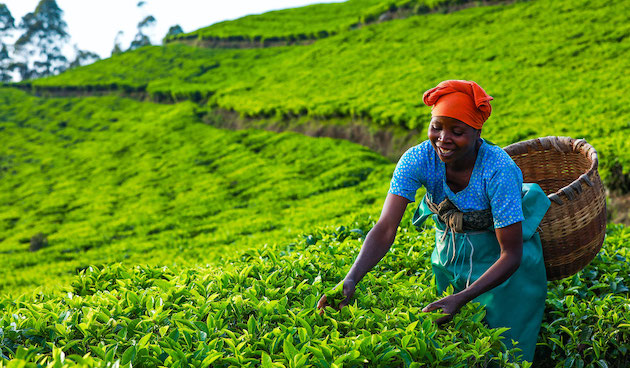[ad_1]

KIGALI, Jun 29 (IPS) – Adeline Umukunzi, a 28-year-old lady mushroom farmer in Musanze, a district positioned about 100 km north of the capital Kigali, stated ladies have usually been the unseen faces of agribusiness in Rwanda.
“Ladies have at all times performed a significant position in agriculture, however behind the scenes. We’re beginning to see increasingly more feminine faces in agribusiness,” she instructed IPS.
Whereas she developed excessive potential and locally-adapted improvements in mushroom farming, the younger cultivator was unaware of how a lot her produce was value to the market. Little did she know that one native meals firm had bought most of her produce to course of mushroom-based biscuits and nuggets.
As a part of Rwanda’s agriculture transformation efforts to reinforce agribusiness competitiveness, a rising variety of ladies are actually engaged in agribusiness, the place many have been capable of generate enterprise advantages all through the worth chain.
Official estimates present that in Rwanda, extra ladies than males are primarily engaged in agriculture, but feminine farmers face extra challenges in beginning profitable agribusinesses than their male counterparts.
Regardless of these challenges, the most recent official developments present that African ladies are abandoning conventional methods of participating in agribusiness and adopting mental property (IP) method to remodel meals methods on the continent.
In response to consultants, adopting IP in agribusiness goals to guard items or companies produced within the sector. It primarily offers with commerce secrets and techniques, described as a vital part for companies to guard confidential data that gives them a aggressive edge.
In response to Olivier Kamana, Everlasting Secretary in Rwanda’s Ministry of Agriculture and Animal Assets, adopting IP rights permits innovators to generate good income.
Kamana instructed IPS that key ladies agripreneurs in Africa might develop commercially viable merchandise, so there must be some IP safety to incentivize the innovator.
In lots of African international locations like Rwanda, the place agriculture is the spine of their nationwide economic system, consultants stress the necessity to embrace expertise, problem-solving capacity, and innovation for ladies.
Official estimates by the UN Meals and Agriculture Group (FAO) point out that round 62 % of ladies in Africa are concerned in farming and do the majority of the work to provide, course of, and market meals.
In response to agriculture consultants, enterprise competitiveness within the regional intra-African buying and selling house supplied by the African Continental Free Commerce Settlement requires agribusiness actors to function extra effectively, which requires investments in new applied sciences, new methods of fertilizing and watering crops, and new methods of connecting to the worldwide market.
For Kamana, African ladies agripreneurs have entry to the kind of improvements they should overcome the distinctive challenges they face.
In the course of the first Africa Regional Mental Property (IP) Convention for Ladies in Agribusiness, which befell in Kigali in Could 2023, delegates expressed the need to advertise improvements in women-led agribusinesses in Africa by serving to them perceive and use IP to deliver their concepts to the world.
Bemanya Twebaze, Director Common of the African Regional Mental Property Group (ARIPO), is satisfied that Mental property (IPR) generally is a highly effective software in empowering ladies and guaranteeing that they profit from their improvements and creations within the agricultural business.
“Policymakers ought to encourage and facilitate IP rights for ladies in agriculture whereas offering authorized and technical support to maximise their prospects of prosperity,” he stated.
Agriculture scientists have made breakthroughs in figuring out the actors that may be thought-about innovators to deliver agricultural improvement and enhance meals manufacturing in Africa by analyzing how mental property rights may very well be largely promoted on the continent.
Estimates present that small farmers, with the vast majority of ladies, represent Africa’s most essential and most succesful innovators, but this class of the workforce continues to be struggling to mixture their produce to produce international markets.
Supporters of IPRs argue that although the unique monopoly on the invention might affect agriculture in Africa, farming communities throughout the continent nonetheless have problem innovating by incorporating new applied sciences or varieties coming from exterior into their manufacturing methods.
After graduating from college a couple of years in the past, Rosine Mwiseneza, a younger lady agripreneur and supervisor of BeeGulf firm based mostly in Kigali, began beekeeping with solely 5 hives within the Rwamagana district from Japanese Rwanda. Quickly after, the variety of hives elevated to fifteen and later to 25.
Mwiseneza instructed IPS that there had been loads of alternative for honey manufacturing in Rwanda with the chance to generate numerous merchandise throughout the worth chain with out intermediaries.
At the moment, Mwiseneza’s firm is producing soaps, candles, and glass containers created from uncooked beeswax with a goal to make acceptable use of IP rights within the stage of this innovation course of.
“We wish to apply for a sound invention patent, and we are assured to get substantial income from these improvements within the close to future,” she instructed IPS.
IPS UN Bureau Report
Follow @IPSNewsUNBureau
Follow IPS News UN Bureau on Instagram
© Inter Press Service (2023) — All Rights ReservedOriginal source: Inter Press Service

